Stellaris: Overlord introduces my new favourite species origin
Become an advanced empire's little minion for fun and profit.
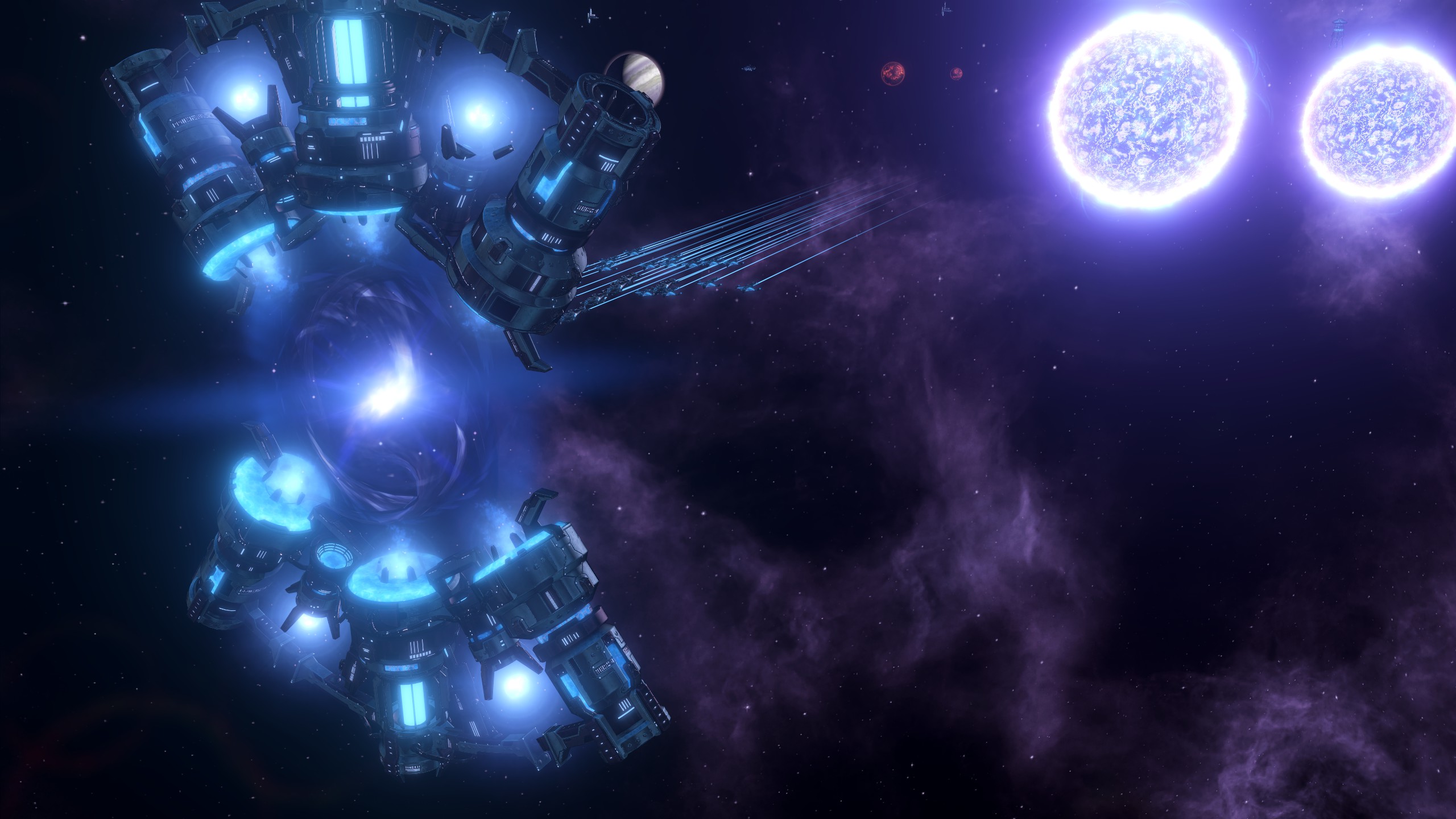
The corner of the galaxy where my species nests is nice and quiet—peaceful, even though it's busy. All the species that call this slice of Stellaris' galactic pizza home are buds, working together for the glory of the Holy Fafossan Empire, which dominates the region. Sure, there were probably some nasty bouts of subjugation in the past, but we're all friends now. We don't have much of a choice, to be fair.
Imperial Fiefdom is one of five new species origins that you can pick in Stellaris: Overlord, giving your custom empire yet more flavour, handy boons and unique obstacles. While the pre-existing Scion origin also starts you off as a vassal, there's a significant difference between being a Fallen Empire's sole vassal and being part of a big, diverse empire.

This particular origin is a showcase of the new vassal mechanics, which Paradox has conjured up to make both sides, vassal and ruler, more engaging, with more benefits for both parties and more ways to interact with your ruler or subject empire. It seems to have paid off.
My clever little fish people have pretty decent lives within this mostly benevolent empire. The contract we have with our ruler is surprisingly chill. We don't have total freedom, but we're mostly left alone to expand and build just as any new space-faring species might. Our diplomacy options are limited, and we have to give up 30% of our research to the empire, but for this we get the protection of the largest fleet around, along with some other major boons.
Do I have recurring nightmares where all my fish pals point at me and shout "collaborator" over and over until I wake up screaming in my conch bed? Of course I do, but nobody uses a conch for a bed and expects a good night's sleep. And there will be time for revolutions and freedom later—for now, we've got the mysteries of the cosmos to unravel.
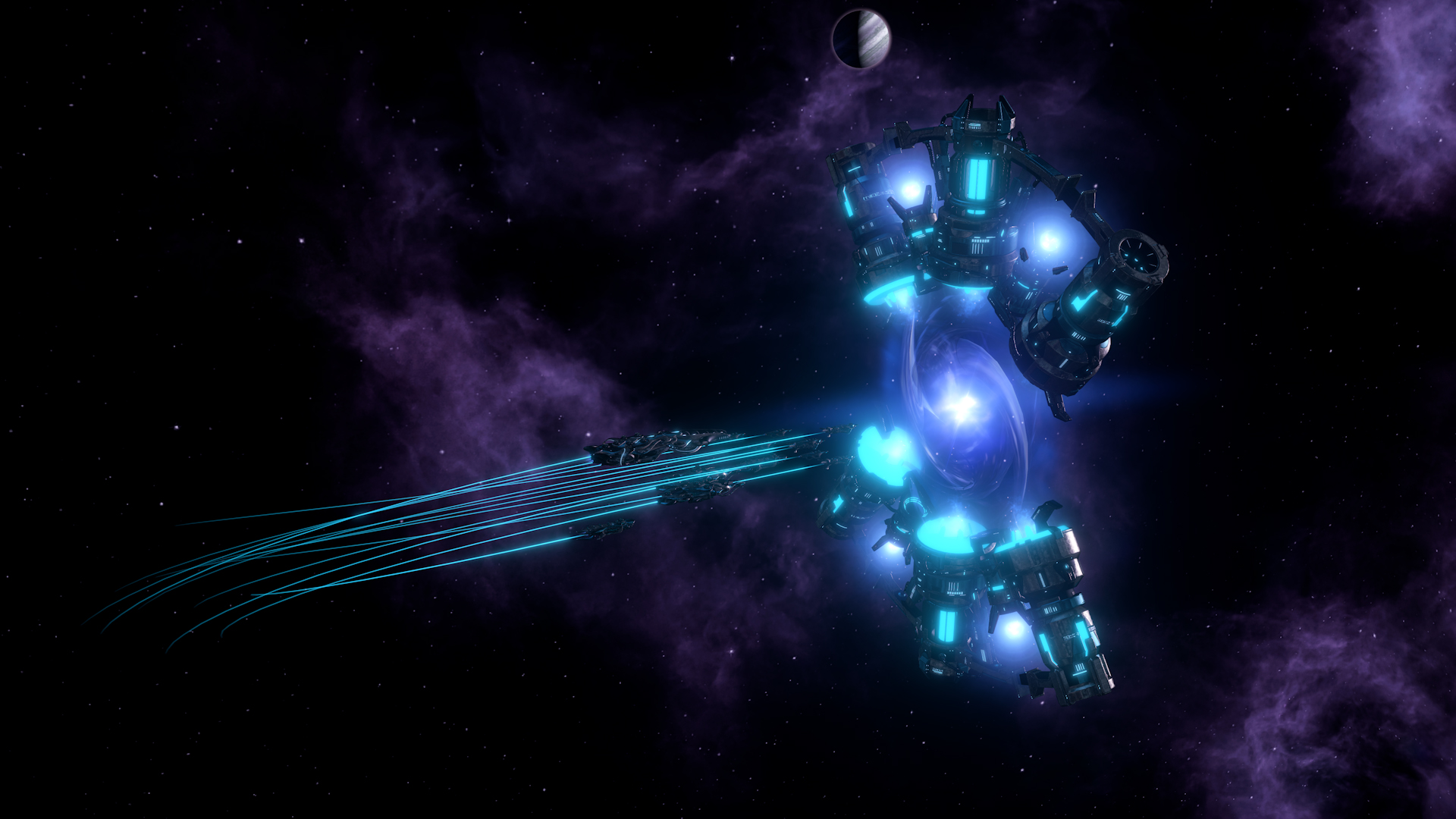
See, we're science specialists. The new vassal system lets you specialise subject empires, which then develop handy traits as they level up within the greater empire they're a part of, making that 30% research tax an easy pill to swallow. This relationship can change as well, reflected in the vassal contract, which can be updated at regular intervals.
The philosophy behind the system is the same one behind Crusader King's, creating power dynamics and relationships that aren't as straightforward as they appear. Vassals can become powerful and essential, almost turning the vassal/ruler relationship on its head, so there's a lot of nuance within what at first seems like a pretty clear cut hierarchy. Thanks to the loyalty and diligence of my fishy folk, my boss thinks very highly of me, which gives me an edge when it comes to updating the vassal contract.
The biggest gaming news, reviews and hardware deals
Keep up to date with the most important stories and the best deals, as picked by the PC Gamer team.
You're not just able to renegotiate how much you give your ruler—you can also make demands about what they give you. Maybe you want a bit of the empire's mineral wealth, for instance. My 30% research tax goes down even easier when the empire is giving me a whole bunch of resources in exchange, in turn making me more powerful and key to the empire's big plans. I should be thinking about independence, but I've got a good thing going here and I don't want to mess it up.
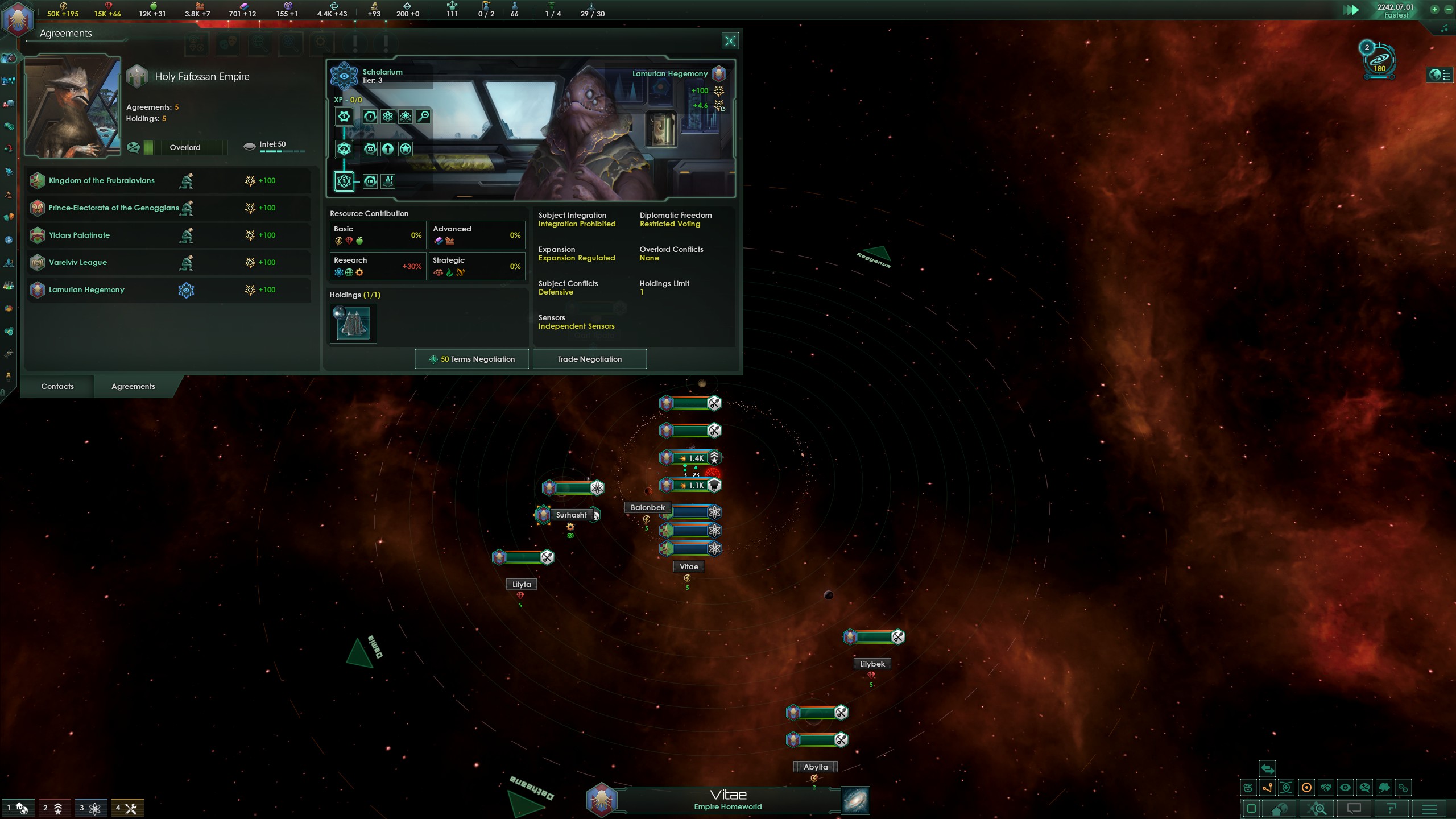
Unfortunately, this is out of my hands. While things seem to be going well in my corner of the empire, there's actually some internal strife occurring in the heartlands. The ruler dies and is replaced, before they too die, followed by their replacement. It's chaos. In a split second, the galactic map completely transforms, fracturing the empire. Now the big blob that the subject empires orbit is gone, replaced by countless little factions with their own agendas. Now the Holy Fafossan Empire, the Fafossan Empire, the Fafossan State, the Fafossan Authority, the Fafossan Administration, the Fafossan Conglomerate and the Interstellar Fafossan Republic are all vying for control, alongside all the former vassals.
It's one of the most exciting things I've seen in Stellaris' early game. It's at this point that all the former vassals and new empires need to decide their future. There's still a remnant of the once great empire, desperately trying to reunite everyone, and lots of others with the same idea, wanting to recreate the empire but under a different ideology. Then there are the species just wanting to enjoy their new found freedoms, making alliances and wars with other species outside of their former empire. It is, naturally, a superb source of drama and conflict, and while I was enjoying the peace and quiet, which allowed me to build some sturdy foundations for my empire, the surprise tonal shift is more than welcome.
I try to make some quick territory grabs with an eye to maybe reforging the old empire under my rule, but there's another prize everyone is ignoring. Right next door is a mid-sized empire that's always been independent, but is otherwise pretty weak, with only a tiny fleet to protect itself. Instead of burning through ships and resources while I fight a dozen burgeoning space empires, I decide to bully the weak kid nobody else has noticed.
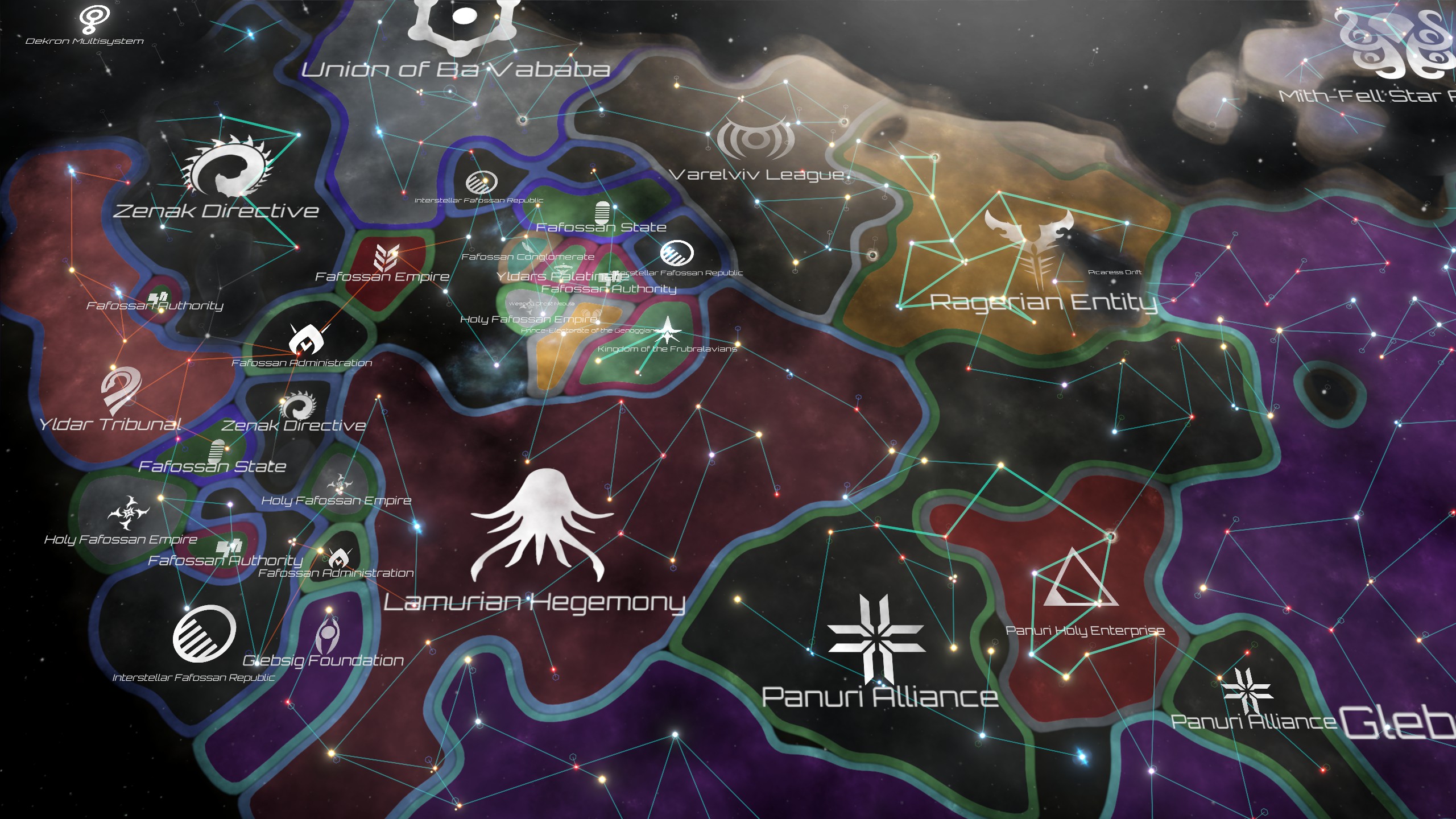
This has major ramifications for the squabble over the old empire. With me bowing out of the conflict, the imperial remnant starts to gobble up the fractured pieces. It might have lost most of its territory, but it still has advanced tech and a massive fleet, and without someone trying to unify the rebels against them, they start to crumble. I might be taking liberties just a wee bit, assuming that my presence would have saved the day, but I am a smart boy with an empire full of smart fish—we definitely would have had an impact. But it wasn't meant to be.
Another even greater conflict is inevitable. It'll take time for the old-new Holy Fafossan Empire to reintegrate all of the territory it lost, and while it's doing that I will be doing something similar with my new acquisitions. Two big, expansionist empires right next to each other? Yeah, that's going to get very messy. And we've got so much history. There's no way my old masters will be content with letting me lead my own superpower. It's going to be a hell of a war.
One question mark is how effectively the AI uses the new vassal system. I got to choose my own specialisation at the start, for instance, but the rest of the empire's vassals were just generic subjects absent special bonuses, suggesting the AI just wasn't assigning them. There have been AI improvements elsewhere, however—specifically military AI improvements, which should make the AI more inclined to create larger fleets instead of lots of little ones. In the wars I was involved in, this did seem to be the case. It's also meant to be better equipped to handle end-game crises, but I'm yet to hit that point.
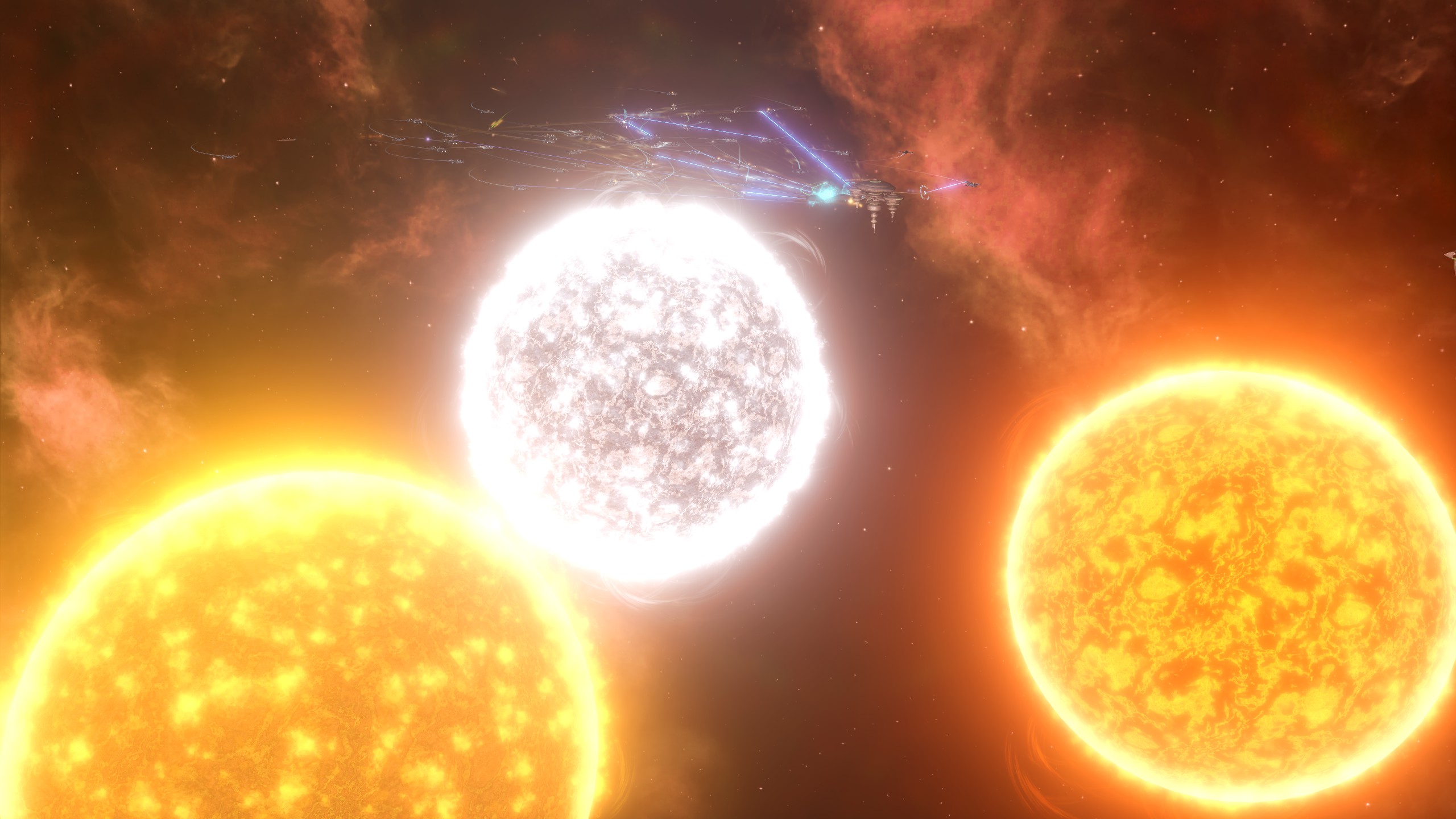
This is not how I saw things going when I decided to play Stellaris as a big empire's wee pal. And while it seems like this fracturing of the empire is a scripted thing that will happen in every Imperial Fiefdom playthrough, there are so many paths the game can take after that point. And it's just one feature in a much larger expansion, which lets you create a new subterranean species, research flashy new tech that makes it easier to travel across the expansive map and meet new enclaves for the purposes of friendship or subjugation.
While this origin is specific to the DLC—which arrives today—the underlying systems that make it a good 'un are part of the accompanying free update. Vassal contracts, subject loyalty and overlord holdings have all been added to the base game, along with some other properly meaningful additions. Though it's pretty standard for a popular Paradox game, it's still reassuring to see Stellaris get this kind of support six years after launch.

Fraser is the UK online editor and has actually met The Internet in person. With over a decade of experience, he's been around the block a few times, serving as a freelancer, news editor and prolific reviewer. Strategy games have been a 30-year-long obsession, from tiny RTSs to sprawling political sims, and he never turns down the chance to rave about Total War or Crusader Kings. He's also been known to set up shop in the latest MMO and likes to wind down with an endlessly deep, systemic RPG. These days, when he's not editing, he can usually be found writing features that are 1,000 words too long or talking about his dog.

